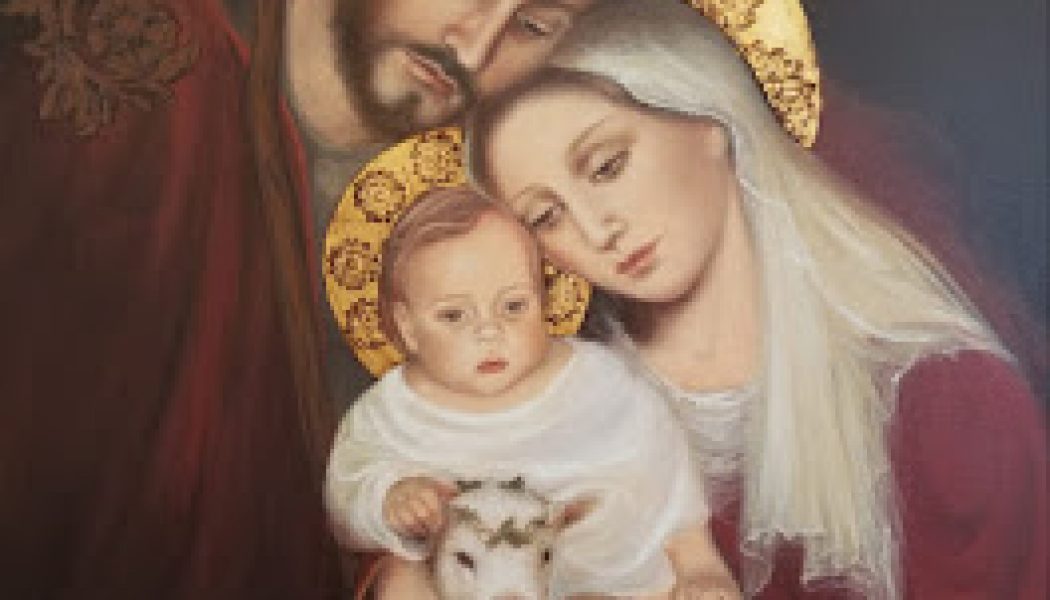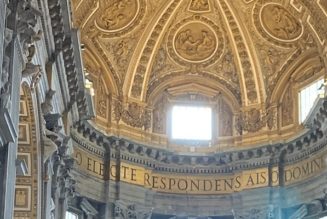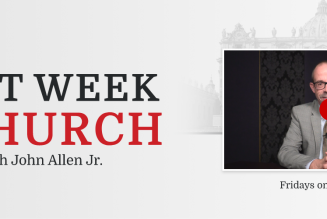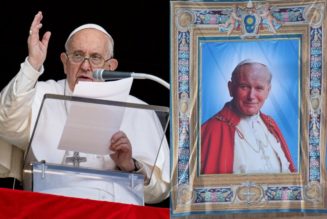I write this because some suggest that those who pray are actually avoiding a task at hand. Yet true prayer avoids nothing. Instead, the one who prays enters the battle between good and evil, and seeking the Lord in the silence of our hearts opens a pathway to victory. Anyone who ever wants to accomplish anything worthy of being a Christian will never accomplish it if he will not take time for prayer. To behold the splendor of the Lord by faith, to say yes to the challenge that it places before the heart, to welcome all the inconvenience and discomfort that it will cause, this is never easy — and yet, to become who we are, to discover the truth about the noble purpose for which we are made, we must say “yes” in prayer to the glory revealed by the Son of Mary, that Lamb of God, that Cause of all Joy, Christ the Lord.
Through all the perplexing circumstances of our lives, through all the strife in the world, through all the failures in the Church, the Babe adored by Magi reveals that God is un-thwarted in his purpose. Seemingly as powerless as an infant’s cry in the night, He advances His priorities with unyielding determination, and his first priority is our salvation. Homeless, He helps us find our way home when we come to adore Him. He carries us with Himself down into the waters of baptism so that He can restore our integrity and re-establish our dignity – re-establishing it above every self-contradiction and misery that threatens our existence. Making of our concerns His own, He turns water into wine so that, even in the face of humiliation, we might find joy. No matter the cost to Himself, He wants us to know how much we are loved and that we can trust Him.
The Lord of Armies has gone homeless with tireless humility so that we might wake from our proud lethargy, rise up and go to the home of our Father. To say He is homeless is to say that He loves though He is not loved. He has confidence even in the face of our lack of confidence. He is never discouraged by evil, even that evil that haunts our own hearts. Quite the opposite – every evil loses heart before this supreme Lord. No evil can stand before His majesty, and when we cling to His presence by faith, believing in Him more than we believe in our own sinfulness, His kindness purifies us of all that is an obstacle to the goodness that He beholds in us.
Our whole existence as creatures is ordered to adoration of this loving Creator. To adore means to kiss with the lips of our mouth. Such an action is not simply physical. We are enfleshed spirits – and all that we do with our body bears something spiritual about it. This means that to offer adoration is to give over our very life breath to another, the very spiritual reality of it. God delights in this humble surrender, but the One who created us never keeps our life’s breath for Himself. Instead, the Lord of Life gives breath-spirit back with renewed supernatural vigor – that Holy Spirit who is the Giver of Life. Adoration, then, is an exchange of kisses – man’s life’s breath for God’s life’s breath.
In the shadow of the epiphany of the Lord, we know from our own broken experience that it is possible to adore someone or something other than God. Such was Herod and those who served him. It is indeed possible to give one’s life’s breath to lesser things. Such things can never give back anything commensurate with such a gift. They offer no new life – only death. That which we trust with our life’s breath always takes possession of us until we belong to it. The one to whom we belong is also the one to whom we are subject. In short, we make ourselves subject to that which we adore. To subject oneself to anything that is less than God means that one is no longer subject to God and therefore, that one belongs to someone else who opposes the life of God. This is why St. John teaches that “whoever sins belongs to the Devil.”
The Devil exists, not as a mental construct of man’s religious imagination, but as a super-intelligent creature bent on our destruction and so very aware of our foolishness. The Devil has acted against his own existence from the beginning and so he has rendered himself capable of nothing other than oppression. God, on the contrary, always acts for the sake of those He loves, and in the simplicity of His essence, He only loves. The Devil would rob us of the life that God wants to breathe into us – for no other reason than he envies the particular love that the Lord has for us. Those who venerate such wickedness are imprisoned by it, locked into fearful calculations and the false sense of security that they offer.
Herod is a reminder of the oppressiveness of political power that is not submitted to God just as the Magi show us sovereign freedom of kingship submitted to the Lord. To reject the Lord, as did Herod, is to allow false worship to thwart the maturity of one’s own humanity. With so much immaturity on display, one does not need to argue that idolatry is alive and well in the 21st Century.
Just as was Herod, there are many people hanging their hats on all kinds of magical thinking. Seduced by the euphoria of spiritual states or the praise of peers or other successes, they are vulnerable to compromising their own integrity. Even if someone did not believe that power, prestige and pleasure were actual gods, they bow their heads to these powers whenever they put these things before the love owed to God and neighbor. We live at a time when it is common for religious and political leaders to make false deities out of ideologies, causes, political agendas, and public appearance. Going with the flow or simply following the popular conventions, even religious conventions, is inevitably a move to idolatry.
John the Baptist testifies that to accept the love of God, to follow the Lamb of God, is to choose the pathway of righteousness for oneself and to reject every form of idolatry. This baptism into truth requires a hard won decision to go against the flow – the flow in culture and the flow in one’s own heart. This is a battle against evil, against every form of compromise, against every enchantment of earthly dreams. It is to climb uphill against all that is comfortable, familiar and convenient – for love is none of these things. Only by following this pathway by faith do we find and come into acceptance of the love of God. Once we accept His love, we possess Him and He belongs to us — and He possess us, and we belong to Him.
Epiphany also reveals that we need the powerful mystery of woman in the plan of salvation. Jesus calls Mary “Woman” at the Wedding Feast of Cana. Woman before the mystery of Christ is as Woman before Adam: the flesh of His flesh and bone of His bones. The first woman helped Adam realize His place in creation and this new woman is the one who assists the Lord in recognizing his place in humanity. She does so by a simple prayer – a prayer that simply makes known a need and even suffers what seems to be the rejection of its unspoken request. In the end, Mary’s confidence in her Son gives Him the space He needs to manifest the glory of God.
Mary anticipates and animates the prayer of the Church today — and we need this part of the grace of Epiphany now more than ever. Everyone is concerned with who has or does not have ecclesial power, whether they are abusing it, whether they are reckless with it. Yet, the most important part of the Church is not its leadership. If the Body of Christ has a head, it also has a heart — and it is for the Heart that the Head lays down His life. Without the Heart, the Body is lifeless. Woman in the Church witnesses to this Heart – this love in the life of the Church.
We need to let the prayer that comes from the heart of the Church be our prayer if the grace of Epiphany is to break upon us. Those who pray with simple trust will suddenly find that the Wedding Feast of Cana is breaking out around them. The voice of the Church coincides with the voice of Mary in the Church, “Go and do whatever He tells you.” Listening to this counsel frees us to act as good servants of the Lord, servants who listen and respond in prayer. Servants whose listening prayer becomes prayerful action. Conversely, not to listen to the Woman who prays, is to deprive ourselves of this freedom to serve the Lord. The Lord is ready to turn water into wine, but He needs us to believe in Him and fill the jars of our hearts with the water of confidence in His mercy and contrition for our sin. Of this, He makes such joy as the world as never seen before.
The voice of the Church helps us realize we cannot overcome any enemy on our own resources, but instead, only through those gifts that come from the One who has loved us to the end, gifts that He lavishes us with in and through the Church. The Bridegroom has won these gifts for us by what He has suffered, and He trusts his Bride, the Church, to share them with everyone who asks for them. The Church exists to teach us to do whatever Christ’s asks of us. Through the obedience of the Church, each soul learns obedience to this Word of the Father, to preach Him to the ends of the earth until the end of time.
Epiphany evokes adoration and obedience. The Lord is ready to breathe his life into us if we will bow ourselves and offer our lives to Him. If we obediently invite Christ into our hearts, though we suffer every torment, we are not without hope and though we die, we are not without life. For His love is our life. His love in us is stronger than death and no matter the power, nothing can overcome the work that He has begun in us. Even Satan and all his evil works are being used by the Lord as providing new ways to unveil the triumph of His love. Christ can do this because He has suffered all our evil unto death but death could not exhaust His love for us. He descended into Hell but Hell could not prevent Him from finding us to take us home. Ascended into heaven, everything is subject to Him and ordered to Him, and so He orders everything, even the labyrinthian ways of our own hearts, to His love – such is glory that baptizes us if we give ourselves to Him.










